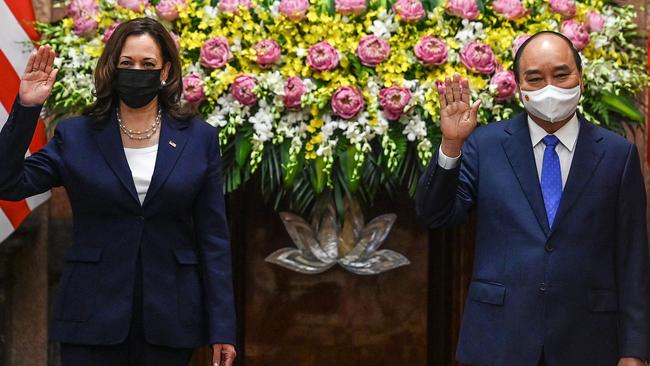Kamala Harris urges Vietnam to stand up to ‘bullying’ China
Kamala Harris has urged Vietnam to join the US to challenge China’s ‘bullying’, a day after accusing Beijing of intimidation in the disputed South China Sea.

US Vice-President Kamala Harris has urged Vietnam to join America to challenge China’s “bullying”, a day after accusing Beijing of intimidation in the disputed South China Sea.
“We need to find ways to pressure and raise the pressure, frankly, on Beijing to abide by the United Nations Convention on the Law of the Sea, and to challenge its bullying and excessive maritime claims,” she said after meeting Vietnamese President Nguyen Xuan Phuc.
The visit, the first to Vietnam by a sitting US vice-president, comes after a two-day stop in Singapore, where Ms Harris took aim at China and sought to shore up US credibility in the wake of the Taliban’s stunning return to power in Afghanistan.
But the Vietnam leg of the Asian tour has sparked criticism after the chaotic evacuation of Kabul prompted comparisons with the trauma of 1975 Saigon, when US helicopters ferried final evacuees from the embassy roof in the last days of the Vietnam War.
Ms Harris is steering clear of Saigon – now named Ho Chi Minh City – and on Wednesday sought to shift the focus from the historical parallels and emphasise Washington’s commitment to Southeast Asia as it opens a regional branch of the US Centres for Disease Control and Prevention in Hanoi.
The US will provide an additional one million coronavirus vaccine doses to Vietnam, expected to arrive by Thursday night. The extra jabs are on top of the five million doses already offered to the country, which is grappling with a fresh Covid-19 surge and low vaccination rates.
In Singapore on Tuesday Ms Harris said Beijing “continues to coerce, to intimidate” and to make unreasonable claims to large areas of the South China Sea.
China claims almost all of the resource-rich waters, through which trillions of dollars in shipping trade passes annually, with competing claims from four Southeast Asian states including Vietnam.
China hit back at Ms Harris, saying the Afghan debacle was an example of “selfish” US foreign policy and accusing Washington of “bullying”.
“It seems that the United States’ only commitment to Southeast Asia is its dedicated efforts to drive a wedge between the Southeast Asian nations and China,” state-run China Daily said.
Events in Afghanistan have cast doubts on US claims of reliability. Pham Quang Vinh, Vietnam’s former ambassador to the US, said the country was watching events in Kabul closely.
“The US has recommitted itself now to this region but if something happens in Afghanistan again, for example if terrorism comes back … will the US continue to focus here?” he said.
Ms Harris is the latest top official from President Joe Biden’s team to visit the region as Washington seeks to reassure allies of its steadfastness.
Her arrival in Hanoi was delayed due to what US officials called an “anomalous health incident” in Hanoi, an apparent reference to the so-called “Havana syndrome” that has afflicted US diplomats in several countries including China and Russia.
Ms Harris’s senior adviser, Symone Sanders, said the delay “has nothing to do with the Vice-President’s health”.
The US is still unsure of what causes the Havana syndrome five years after the first case in Cuba when US diplomats and their families complained of nosebleeds, migraines, and nausea after experiencing piercing sounds at night.
The mysterious incidents have led to unproven allegations that Russians or others used sonic or other high-intensity electronic devices to physically harm US diplomats.
AFP and agencies



To join the conversation, please log in. Don't have an account? Register
Join the conversation, you are commenting as Logout